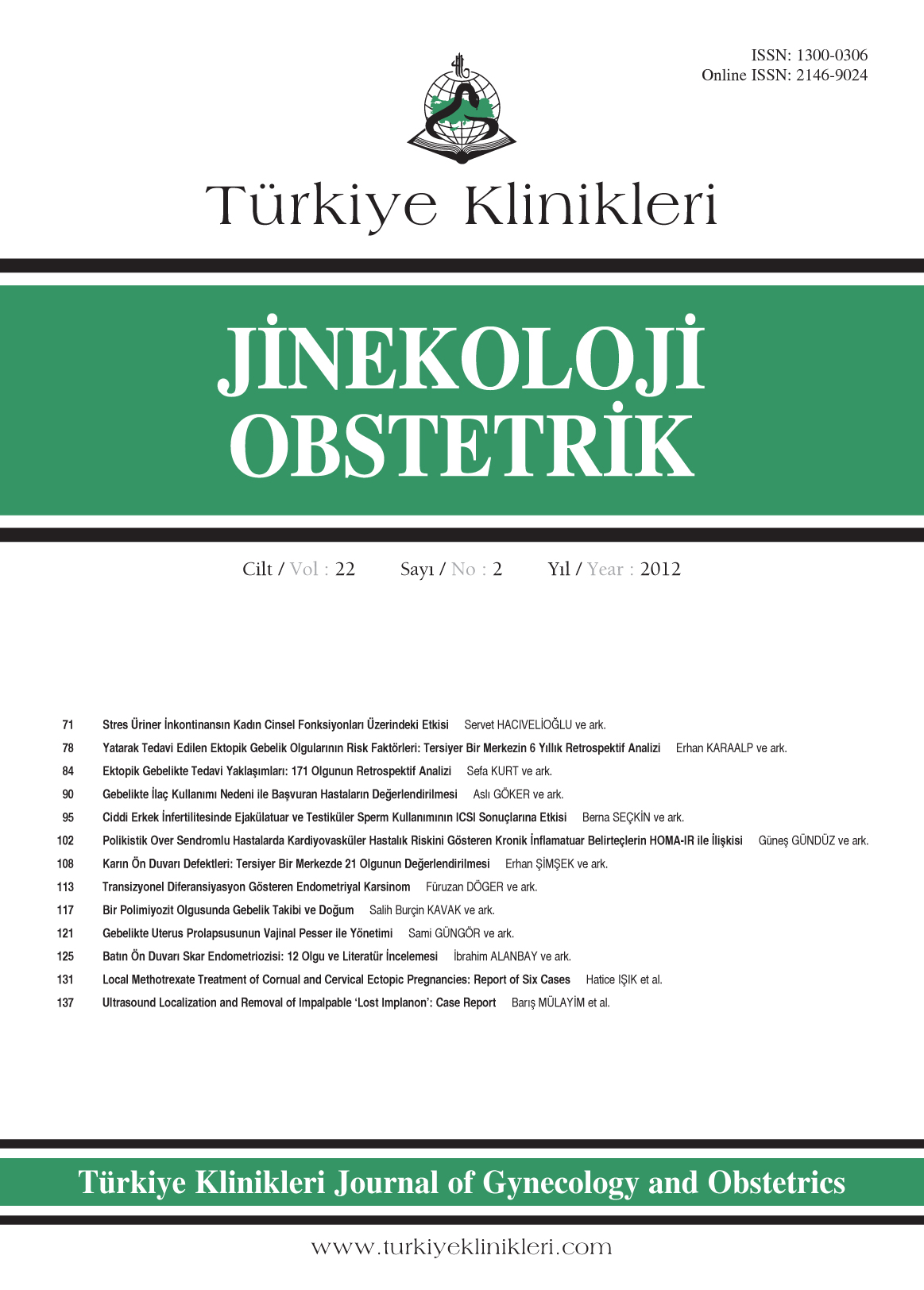Open Access
Peer Reviewed
ORIGINAL RESEARCH
2334 Viewed893 Downloaded
The Effect of Ejaculated and Testicular Sperm on ICSI Outcomes in Severe Male Infertility
Ciddi Erkek İnfertilitesinde Ejakülatuar ve Testiküler Sperm Kullanımının ICSI Sonuçlarına Etkisi
Turkiye Klinikleri J Gynecol Obst. 2012;22(2):95-101
Article Language: TR
Copyright Ⓒ 2020 by Türkiye Klinikleri. This is an open access article under the CC BY-NC-ND license (http://creativecommons.org/licenses/by-nc-nd/4.0/)
ÖZET
Amaç: Ciddi erkek infertilitesi nedeniyle intrasitoplasmik sperm enjeksiyonu (ICSI) uygulanılan hastalarda, ejakülat ve testis kaynaklı spermin tedavi sonuçlarına etkisinin karşılaştırılmasıdır. Gereç ve Yöntemler: ICSI uygulanan, yeterli over rezervine sahip normoovulatuar 39 yaş ve altında kadınların yer aldığı toplam 141 çift bu retrospektif çalışmaya dâhil edildi. Her hasta yalnız tek bir tedavi siklusunda değerlendirildi. Hastalar kullanılan sperm kaynağına göre 2 gruba ayrıldı. Grup 1 (n=87) ejakülattan sperm elde edilen ciddi oligoastenoteratospermi olguları (Ejakülatuar Sperm Grubu), grup 2 (n=54) cerrahi yolla testisten sperm elde edilen non-obstrüktif azoospermi olguları (Testiküler Sperm Grubu) olarak belirlendi. Fertilizasyon oranı, embriyo kalitesi, implantasyon ve klinik gebelik oranları açısından gruplar karşılaştırıldı. İstatistiksel analiz yöntemi olarak Student-t testi ve ki-kare testi kullanıldı. p<0,05 anlamlı olarak kabul edildi. Bulgular: Ortalama kadın yaşı, bazal FSH düzeyi, toplanan oosit sayısı ve transfer edilen embriyo sayısı açısından her 2 grup benzerdi. Fertilizasyon oranı ejakülatuar sperm grubunda daha yüksek olarak bulundu, ancak farkın istatistiksel anlamlılık sınırında kaldığı saptandı (%59,91±22,01'e karşılık %52,49±22,87, p=0,058). Transfer edilen iyi kalitede embriyo sayısı, implantasyon oranı ve klinik gebelik oranı açısından ise gruplar arasında istatistiksel anlamda farklılık gözlenmedi. Sonuç: Ciddi erkek infertilitesinde testiküler sperm ve ejakülatuar sperm kullanılarak yapılan ICSI tedavisi ile benzer klinik sonuçlar elde edilebilmektedir. Testiküler sperm elde edilmesinin invaziv bir girişim olması nedeniyle mümkün olan olgularda ejakülatuar sperm tercih edilebilir.
Amaç: Ciddi erkek infertilitesi nedeniyle intrasitoplasmik sperm enjeksiyonu (ICSI) uygulanılan hastalarda, ejakülat ve testis kaynaklı spermin tedavi sonuçlarına etkisinin karşılaştırılmasıdır. Gereç ve Yöntemler: ICSI uygulanan, yeterli over rezervine sahip normoovulatuar 39 yaş ve altında kadınların yer aldığı toplam 141 çift bu retrospektif çalışmaya dâhil edildi. Her hasta yalnız tek bir tedavi siklusunda değerlendirildi. Hastalar kullanılan sperm kaynağına göre 2 gruba ayrıldı. Grup 1 (n=87) ejakülattan sperm elde edilen ciddi oligoastenoteratospermi olguları (Ejakülatuar Sperm Grubu), grup 2 (n=54) cerrahi yolla testisten sperm elde edilen non-obstrüktif azoospermi olguları (Testiküler Sperm Grubu) olarak belirlendi. Fertilizasyon oranı, embriyo kalitesi, implantasyon ve klinik gebelik oranları açısından gruplar karşılaştırıldı. İstatistiksel analiz yöntemi olarak Student-t testi ve ki-kare testi kullanıldı. p<0,05 anlamlı olarak kabul edildi. Bulgular: Ortalama kadın yaşı, bazal FSH düzeyi, toplanan oosit sayısı ve transfer edilen embriyo sayısı açısından her 2 grup benzerdi. Fertilizasyon oranı ejakülatuar sperm grubunda daha yüksek olarak bulundu, ancak farkın istatistiksel anlamlılık sınırında kaldığı saptandı (%59,91±22,01'e karşılık %52,49±22,87, p=0,058). Transfer edilen iyi kalitede embriyo sayısı, implantasyon oranı ve klinik gebelik oranı açısından ise gruplar arasında istatistiksel anlamda farklılık gözlenmedi. Sonuç: Ciddi erkek infertilitesinde testiküler sperm ve ejakülatuar sperm kullanılarak yapılan ICSI tedavisi ile benzer klinik sonuçlar elde edilebilmektedir. Testiküler sperm elde edilmesinin invaziv bir girişim olması nedeniyle mümkün olan olgularda ejakülatuar sperm tercih edilebilir.
ANAHTAR KELİMELER: Azospermi; fertilizasyon; kısırlık, erkek; sperm enjeksiyonu, sitoplazma içine; spermin elde edilmesi
ABSTRACT
Objective: To compare the outcome of intracytoplasmic sperm injection (ICSI) cycles using ejaculated and testicular spermatozoa in couples with severe male factor infertility. Material and Methods: This retrospective study included 141 couples with favorable ovarian reserve, normoovulatory females younger than 39 years. Patients were evaluated in a single IVF treatment cycle and divided into two groups according to sperm sources. Group 1 (n=87) in patients with severe oligoteratoastenospermia using ejaculated sperm (Ejaculated Sperm Group), group 2 (n=54) in non-obstructive azoospermia patients with sperm retrieved by testicular sperm extraction (Testicular Sperm Group). Fertilization, embryo quality, implantation and clinical pregnancy rates were compared. For the statistical analyses, Student-t test and Chi-square test were used. A P-value of<0.05 was considered statistically significant. Results: No differences were found among the groups in terms of the female age, female basal FSH levels, number of oocytes retrieved and number of embryos transferred. Fertilization rate was higher in ejaculated sperm group, but it was of borderline significance (59.91±22.01% vs. 52.49±22.87%, P=0.058). There were no significant differences in according to good quality embryos transferred, implantation and clinical pregnancy rates in testicular and ejaculated sperm groups. Conclusion: In severe male factor infertility, similar clinical outcomes can be achieved with ICSI cycles using testicular and ejaculated sperm. Because of the surgical sperm retrieval is an invasive procedure, the use of ejaculated sperm can be preferred whenever possible.
Objective: To compare the outcome of intracytoplasmic sperm injection (ICSI) cycles using ejaculated and testicular spermatozoa in couples with severe male factor infertility. Material and Methods: This retrospective study included 141 couples with favorable ovarian reserve, normoovulatory females younger than 39 years. Patients were evaluated in a single IVF treatment cycle and divided into two groups according to sperm sources. Group 1 (n=87) in patients with severe oligoteratoastenospermia using ejaculated sperm (Ejaculated Sperm Group), group 2 (n=54) in non-obstructive azoospermia patients with sperm retrieved by testicular sperm extraction (Testicular Sperm Group). Fertilization, embryo quality, implantation and clinical pregnancy rates were compared. For the statistical analyses, Student-t test and Chi-square test were used. A P-value of<0.05 was considered statistically significant. Results: No differences were found among the groups in terms of the female age, female basal FSH levels, number of oocytes retrieved and number of embryos transferred. Fertilization rate was higher in ejaculated sperm group, but it was of borderline significance (59.91±22.01% vs. 52.49±22.87%, P=0.058). There were no significant differences in according to good quality embryos transferred, implantation and clinical pregnancy rates in testicular and ejaculated sperm groups. Conclusion: In severe male factor infertility, similar clinical outcomes can be achieved with ICSI cycles using testicular and ejaculated sperm. Because of the surgical sperm retrieval is an invasive procedure, the use of ejaculated sperm can be preferred whenever possible.
MENU
POPULAR ARTICLES
MOST DOWNLOADED ARTICLES





This journal is licensed under a Creative Commons Attribution-NonCommercial-NoDerivatives 4.0 International License.











